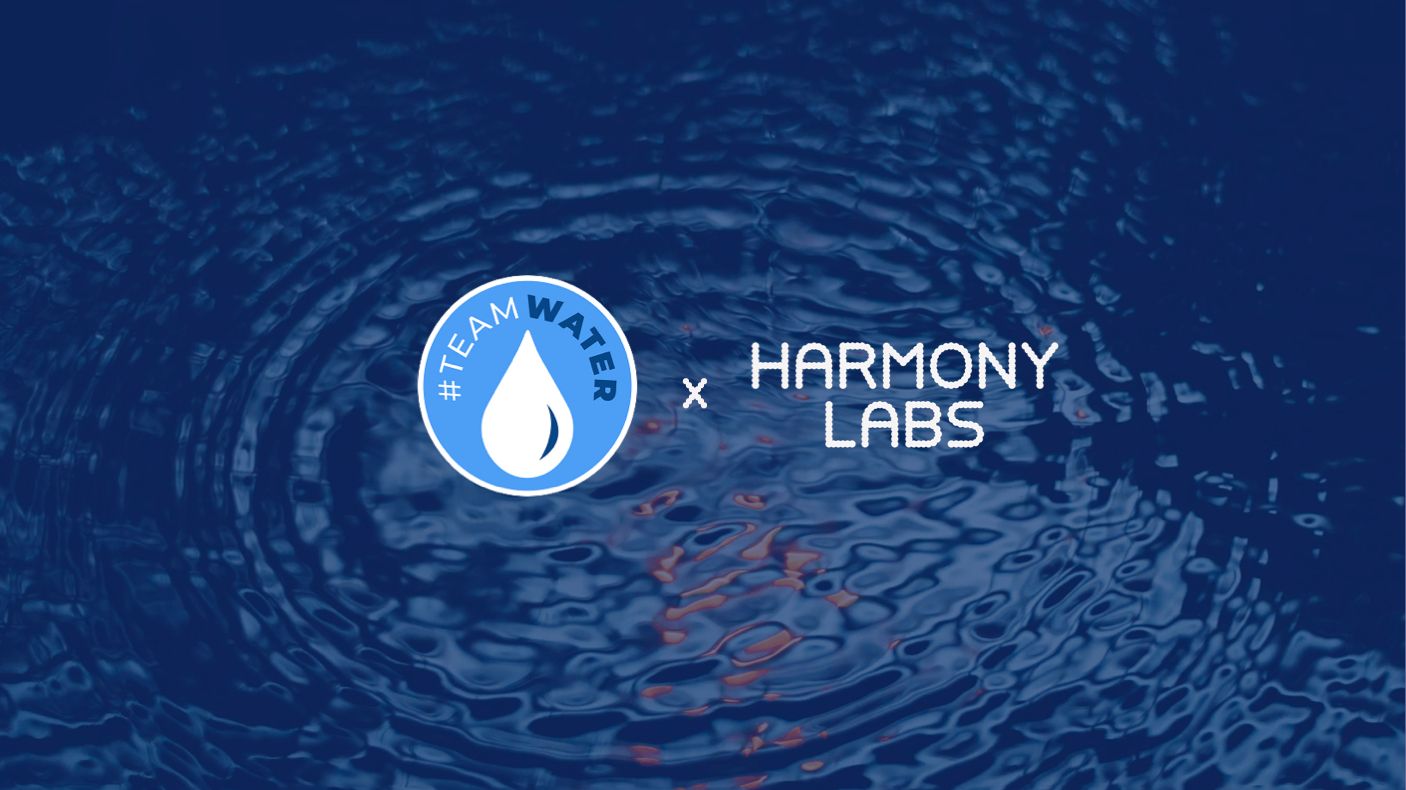Four Principles For Building Power in Media

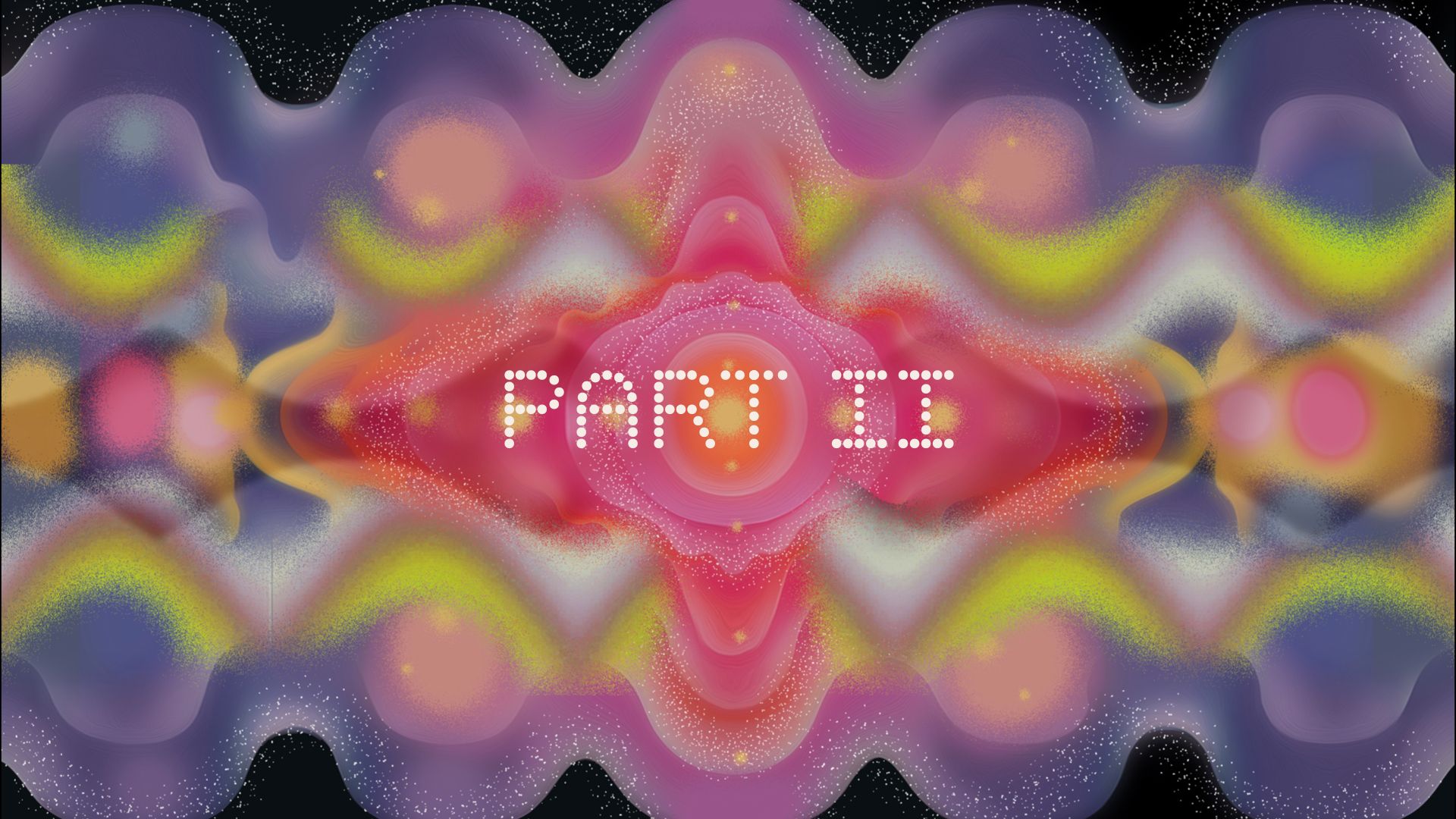
2025-07-17
This is Part II of our ongoing survey dispatch capturing audiences’ evolving deep stories on equality. You can read Part I, Part III, and Part IV here.
In collaboration with experts and practitioners in the fields of equality and narrative, Harmony Labs developed a narrative goal for systemic equality. One of the key pillars of this narrative goal is a belief in personal agency, and progress towards equality is measured by moving people to agree that:
All of us are responsible for creating an equal future. Systems are entirely products of human programming. Only humans can change systems to remediate historical racist harms and prevent new future harms. All of us are affected by systems, and all of us have the power and responsibility to make new rules in every aspect of our lives that actively create equality.
Since all of us contribute to making an equal future, one where people are able to flourish, it’s important to understand whether people see themselves as playing a role in it at all.
We studied attitudes about hard work, meritocracy, and control over personal outcomes because beliefs about personal agency can shape how people understand success and influence their support for policies addressing inequality. What we found was more complex than expected.
We asked people whether they agree that if they work hard, they will succeed, then analyzed those responses relative to our four values-distinct audiences (you can learn more about those audiences here). More than 1 in 2 people from our community-oriented audience, People Power, agreed with the statement (54%). However, all other audiences expressed much stronger belief in individual effort: 79% of Don’t Tread on Me agreed, 70% of Tough Cookies, and 69% of If You Say So.
We also wondered whether a weaker belief in individual effort translates into a deterministic worldview. The answer is ‘no.’ Only 28% of People Power agree that what they do is mainly determined by others, and 42% disagree with that statement. This suggests that People Power doesn’t see themselves as powerless. They acknowledge the limits of individual effort but also don’t overwhelmingly attribute outcomes to external forces. Don’t Tread On Me, in contrast, holds a more individualistic worldview, strongly endorsing individual effort and rejecting the idea that life outcomes are determined by systemic or external forces. This is evident in an anonymous survey response from a Don’t Tread on Me audience member, stressing that circumstances can change through their own efforts:
“I work two crappy part-time jobs working six days per week while seeking new opportunities. I cope by trying to move forward… every dog has his day, and hopefully mine is coming.“
One hypothesis for why People Power is skeptical of both absolute free will (“if I work hard, I will succeed”) and absolute determinism (“what I do is mainly determined by others”) is that they have a more nuanced understanding of systems and individuals and the interplay between them that shapes life outcomes.
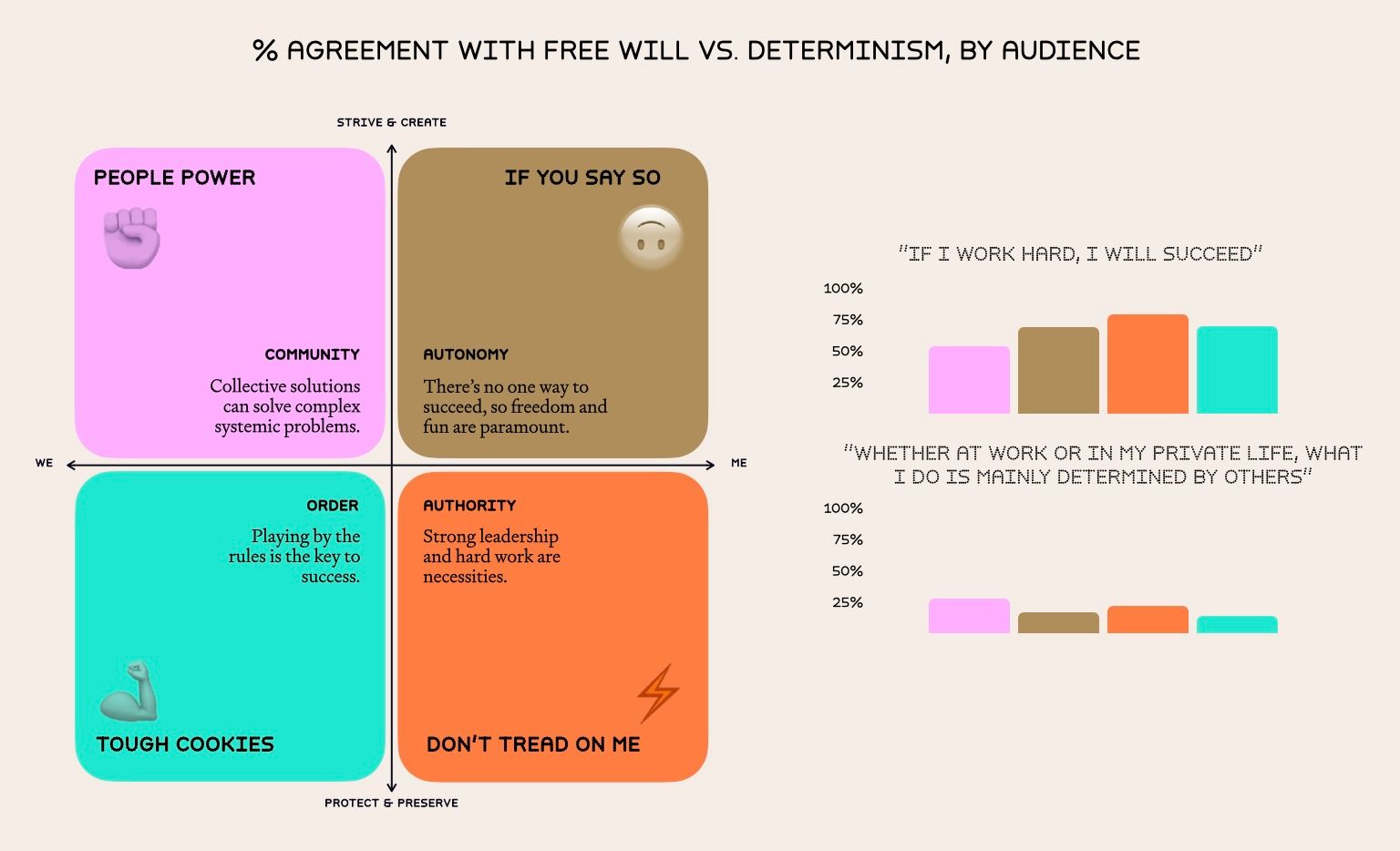
Health is one place where we can observe how people apply their views of agency and systems to their own lives. Across all audiences, regardless of whether they generally believe in individual agency or systemic forces, the most common answer to “what would make you a lot more healthy” is “getting more exercise,” hovering around ~40%. This suggests that, when it comes to health, even system-oriented audiences in the U.S. default to individualistic approaches to achieving and maintaining health.
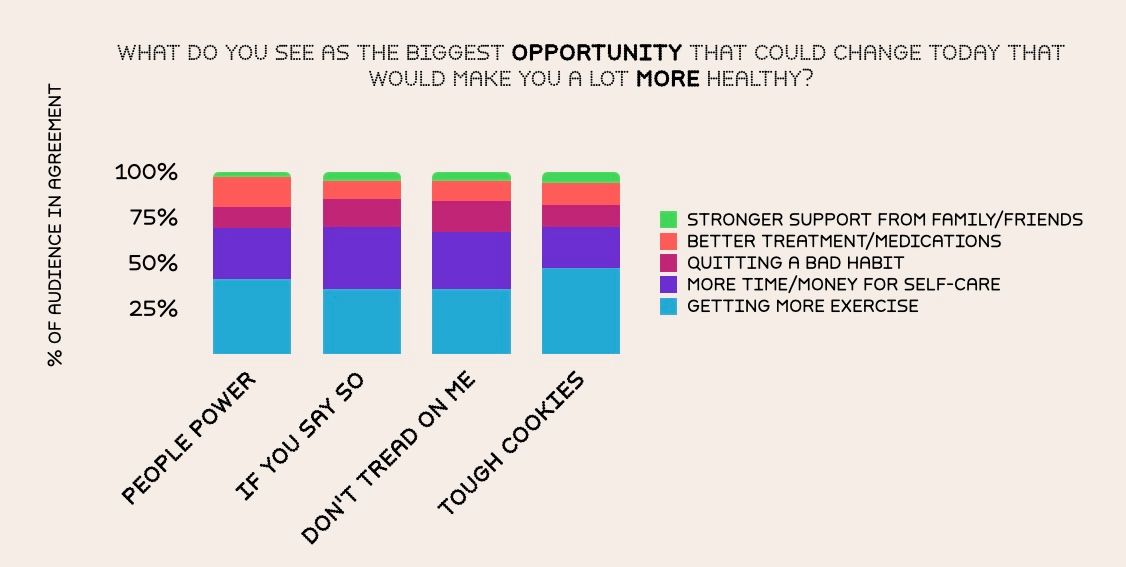
However, there are important differences in how audiences view health risks. People Power stands out for seeing the biggest risk as a systemic one: losing access to healthcare or medications (31%). Other audiences saw the biggest risks as individual and personal: developing a new health condition or losing their ability to be physically active as their perceived top risk. This anonymous response from a People Power audience member powerfully expresses that view:
“When I had a miscarriage over 12 years ago, my struggles with health insurance in the middle of that loss made me realize the callousness of not only our healthcare system, but by extension the brokenness of the many systems in our government that are supposed to help people, but whose policies end up being dictated not by the needs of the people, but by the bottom line.“
While most people look to personal actions to improve health, some, like People Power, are also acutely aware of the role that systems and access play in shaping health outcomes.
Another phenomenon worth investigating that is deeply connected to agency is meritocracy as it relates to race, because it reflects not just how people see themselves, but also how they explain the success or failure of entire groups in society—that a group is doing well simply because of how hard they work, or how capable they are.
Not surprisingly, only 8% of People Power endorse the idea that merit explains differences in outcomes between race groups. We observed the highest alignment with a meritocratic view amongst Don’t Tread on Me, the audience with authority values—42% think that a race group’s merit is the explanation for how well they are doing. If You Say So recognizes that differences in success outcomes can’t solely be explained by merit when systemic inequalities persist, as expressed in this anonymous survey response:
“After going through college I have an understanding of how society works and how unequal socioeconomic status is between the ultra wealthy that keeps getting richer, and the people who grew up poor or lower middle class with little government social support.“
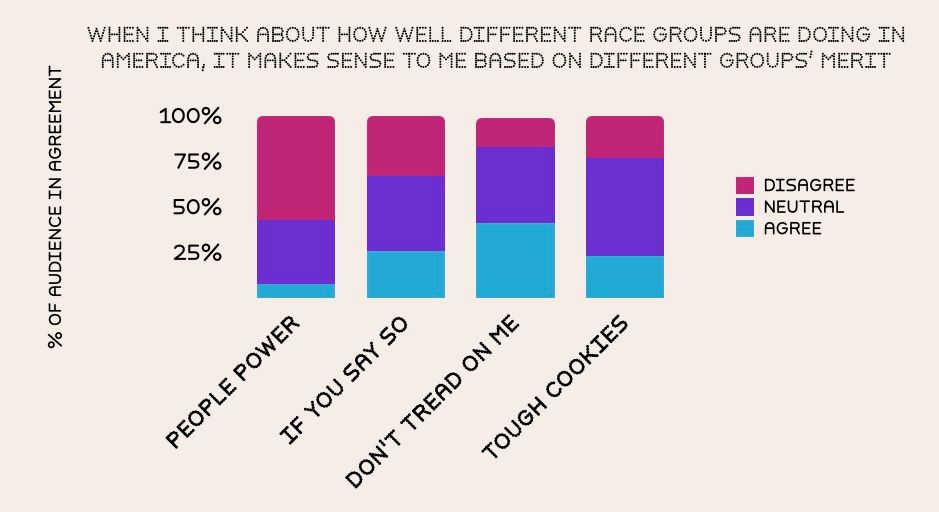
Nobody is satisfied with keeping things exactly as they are—that sentiment barely registers among any group. And when it comes to the pace of change, there’s remarkable agreement: most people across audiences gravitate toward gradual progress rather than complete upheaval. While the journey looks similar, the destinations are worlds apart, reflecting audiences’ core values and openness to change.
When we examine the numbers, over 40% of both Don’t Tread On Me and Tough Cookies prefer “making small changes bit by bit.” Similarly, over 40% of If You Say So and People Power audiences favor “taking small steps.” On the surface, this suggests a shared moderate approach—everyone walking the same careful path forward.
The divergence becomes clear only when we look at what lies at the end of the path. For People Power (54%) and If You Say So (43%), those small steps are building toward something transformative: “a complete overhaul of the system.” This mindset is reflected in how an If You Say So audience member describes personal transformation and breaking free of systemic constraints in this anonymous survey response:
“Biggest transformation [in my life] has been completely deconstructing from society's pressures – like following what I want to do even if it doesn’t go with the status quo. I feel like a new person.“
Meanwhile, Tough Cookies (43%) and Don’t Tread On Me (40%) see those same small steps as a way to strengthen and refine what already exists. They prefer “making small changes bit by bit to make things a little better,” reflecting their core value of preserving and protecting.
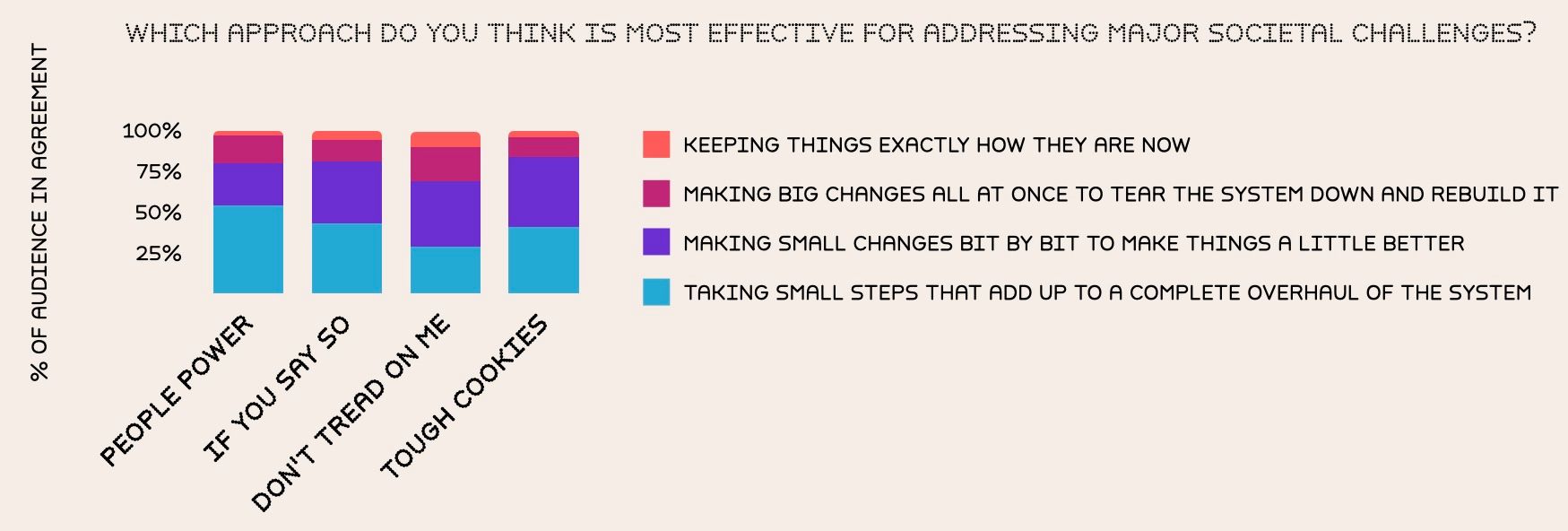
The bottom line is that audiences with a “strive and create” mindset see gradual change as the path to bold transformation, while those with a “protect and preserve” orientation welcome change, as long as it reinforces what already works within the current system.
Individualist audiences like Don’t Tread On Me and If You Say So need stories that help them see that the system doesn’t give everyone the same personal agency or freedom to make the change that they value for themselves. At the same time, there’s an opportunity to help audiences like People Power, who see the system as overwhelmingly powerful, recognize that individuals can and do succeed despite systemic barriers, and that personal action can make a difference, especially in conjunction with systemic reform.
By creating a new narrative terrain that unites these perspectives, new stories can help all audiences see both the limits and possibilities of agency within our systems, better understand each other, and see their own power and responsibility in shaping a more equal future.
In the next survey dispatch, we’ll explore narrative opportunities to bring audiences closer to both imagining what it takes to eliminate disparities, and understand how different audiences think about equity-driven resource distribution. Read Part I, Part III, Part IV, and subscribe to our newsletter for updates about our latest research.


